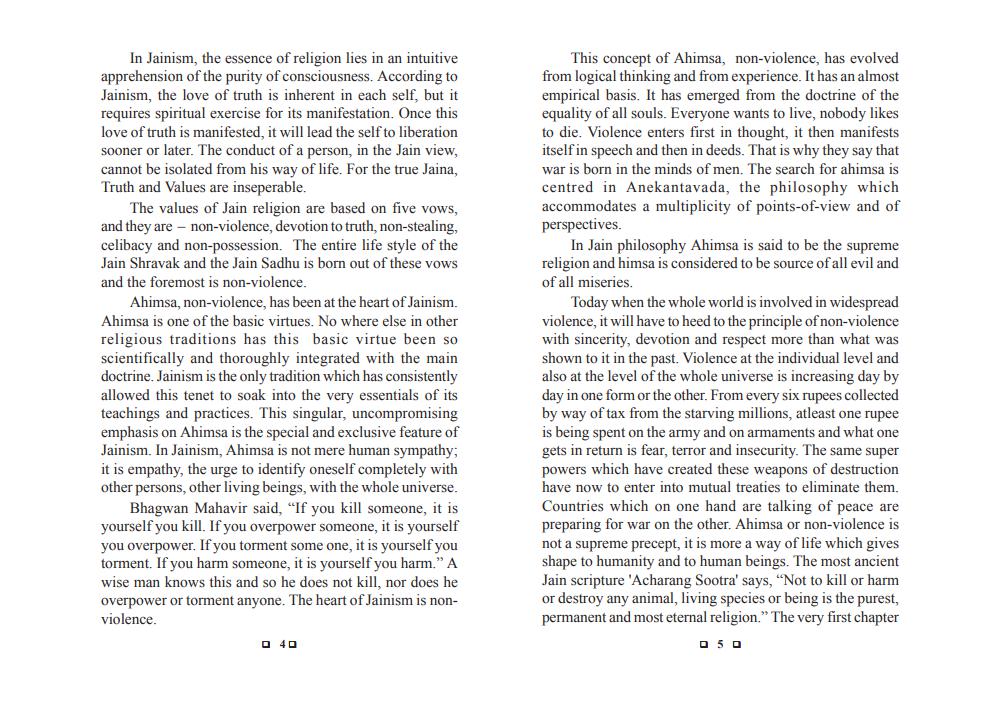________________
In Jainism, the essence of religion lies in an intuitive apprehension of the purity of consciousness. According to Jainism, the love of truth is inherent in each self, but it requires spiritual exercise for its manifestation. Once this love of truth is manifested, it will lead the self to liberation sooner or later. The conduct of a person, in the Jain view, cannot be isolated from his way of life. For the true Jaina, Truth and Values are inseperable.
The values of Jain religion are based on five vows, and they are - non-violence, devotion to truth, non-stealing, celibacy and non-possession. The entire life style of the Jain Shravak and the Jain Sadhu is born out of these vows and the foremost is non-violence.
Ahimsa, non-violence, has been at the heart of Jainism. Ahimsa is one of the basic virtues. No where else in other religious traditions has this basic virtue been so scientifically and thoroughly integrated with the main doctrine. Jainism is the only tradition which has consistently allowed this tenet to soak into the very essentials of its teachings and practices. This singular, uncompromising emphasis on Ahimsa is the special and exclusive feature of Jainism. In Jainism, Ahimsa is not mere human sympathy; it is empathy, the urge to identify oneself completely with other persons, other living beings, with the whole universe.
Bhagwan Mahavir said, "If you kill someone, it is yourself you kill. If you overpower someone, it is yourself you overpower. If you torment some one, it is yourself you torment. If you harm someone, it is yourself you harm." A wise man knows this and so he does not kill, nor does he overpower or torment anyone. The heart of Jainism is nonviolence.
40
This concept of Ahimsa, non-violence, has evolved from logical thinking and from experience. It has an almost empirical basis. It has emerged from the doctrine of the equality of all souls. Everyone wants to live, nobody likes to die. Violence enters first in thought, it then manifests itself in speech and then in deeds. That is why they say that war is born in the minds of men. The search for ahimsa is centred in Anekantavada, the philosophy which accommodates a multiplicity of points-of-view and of perspectives.
In Jain philosophy Ahimsa is said to be the supreme religion and himsa is considered to be source of all evil and of all miseries.
Today when the whole world is involved in widespread violence, it will have to heed to the principle of non-violence with sincerity, devotion and respect more than what was shown to it in the past. Violence at the individual level and also at the level of the whole universe is increasing day by day in one form or the other. From every six rupees collected by way of tax from the starving millions, atleast one rupee is being spent on the army and on armaments and what one gets in return is fear, terror and insecurity. The same super powers which have created these weapons of destruction have now to enter into mutual treaties to eliminate them, Countries which on one hand are talking of peace are preparing for war on the other. Ahimsa or non-violence is not a supreme precept, it is more a way of life which gives shape to humanity and to human beings. The most ancient Jain scripture 'Acharang Sootra' says, "Not to kill or harm or destroy any animal, living species or being is the purest, permanent and most eternal religion." The very first chapter
50




